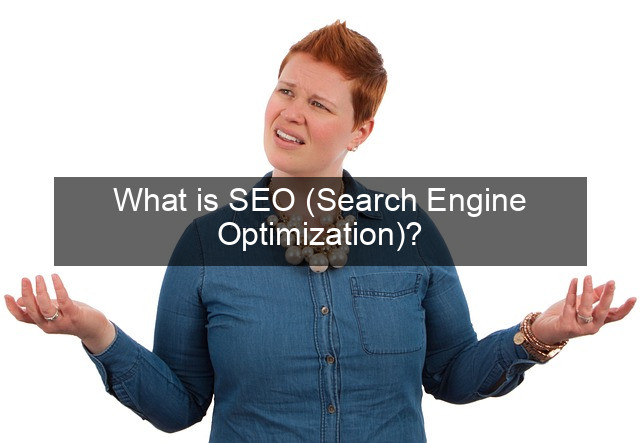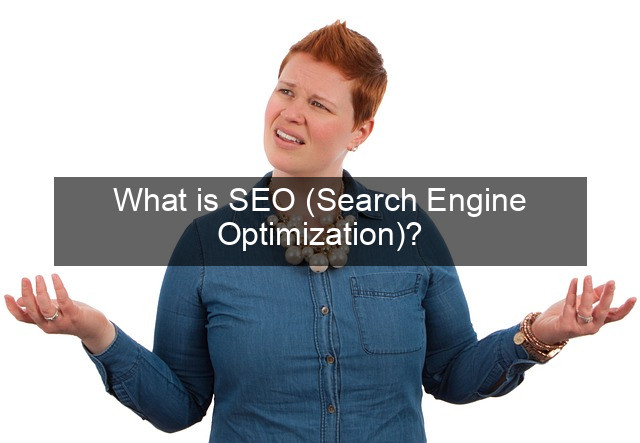What is SEO (Search Engine Optimization)?

- What is SEO (Search Engine Optimization)?
- What is SEO (Search Engine Optimization)?
- On-Page Optimization
- Content is King
- Technical SEO
- Keyword Research
- Off-Page Optimization
- Link Building
- Social Media Marketing
- Local SEO (If applicable)
- Measuring SEO Success
- Analytics and Reporting
- Conclusion
- Frequently Asked Questions (FAQ)

What is SEO (Search Engine Optimization)?
Imagine a vast library filled with billions of books. How would you find the exact one you’re looking for? You’d likely use the library’s catalog, searching by title, author, or subject. Search engines like Google work similarly, acting as a massive catalog for the internet. SEO, or Search Engine Optimization, is the practice of optimizing your website to rank higher in these search results, making it easier for potential customers to find you. In today’s digital landscape, a strong SEO strategy is crucial for any business looking to thrive online. It’s not just about attracting more visitors; it’s about attracting the right visitors – those actively searching for the products or services you offer. This targeted approach leads to higher conversion rates, increased brand visibility, and ultimately, greater business success.
On-Page Optimization
Content is King
Creating high-quality, relevant content is the cornerstone of effective SEO. This means providing valuable information that answers users’ search queries and keeps them engaged. Think beyond simple keywords and focus on providing comprehensive, in-depth content that demonstrates your expertise. This not only satisfies search engines but also builds trust with your audience.
Content should be well-structured, easy to read, and visually appealing. Use headings, subheadings, bullet points, and images to break up large blocks of text and improve readability. Regularly updating your content with fresh insights and perspectives also signals to search engines that your website is active and relevant.
Furthermore, incorporating various content formats, such as videos, infographics, and interactive elements, can enhance user experience and further boost your SEO efforts.
Technical SEO
Technical SEO focuses on optimizing the technical aspects of your website to improve its crawlability and indexability by search engines. This involves ensuring your website loads quickly, is mobile-friendly, and has a clear site architecture. A well-structured website allows search engines to easily navigate and understand your content.
Other important technical elements include optimizing your website’s code, using structured data markup, and creating an XML sitemap. These elements help search engines understand the context and content of your web pages, leading to more accurate indexing and higher rankings.
Regularly auditing your website for technical issues and addressing them promptly is crucial for maintaining a healthy and search engine-friendly website.
Keyword Research
Keywords are the terms and phrases people use when searching online. Effective keyword research involves identifying the most relevant keywords for your business and incorporating them strategically into your website’s content. This helps search engines understand what your website is about and match it with relevant searches.
However, keyword stuffing, or overuse of keywords, can be detrimental to your SEO efforts. Focus on using keywords naturally and organically within your content, prioritizing user experience over search engine manipulation.
Utilize keyword research tools to identify high-volume, low-competition keywords that align with your business objectives and target audience.
Off-Page Optimization
Link Building
Link building is the process of acquiring backlinks from other reputable websites. Backlinks act as votes of confidence, signaling to search engines that your website is a trustworthy and authoritative source of information. High-quality backlinks from relevant websites can significantly improve your search engine rankings.
Focus on earning backlinks from authoritative websites in your industry. Guest blogging, participating in industry forums, and creating shareable content are effective strategies for building high-quality backlinks.
Avoid engaging in black-hat link building practices, such as buying backlinks or participating in link schemes. These practices can result in penalties from search engines and harm your website’s reputation.
Social Media Marketing
While social media signals aren’t a direct ranking factor, a strong social media presence can indirectly benefit your SEO efforts. Sharing your content on social media platforms can increase its visibility and reach, leading to more backlinks and increased brand awareness.
Engage with your audience on social media, respond to comments and questions, and build a strong online community. This fosters brand loyalty and can indirectly influence your search engine rankings.
Promote your content across various social media channels to maximize its reach and potential for attracting backlinks.
Local SEO (If applicable)
If you have a local business, optimizing your website for local search is essential. This involves creating a Google My Business profile, listing your business in relevant online directories, and optimizing your website for local keywords.
Local SEO helps your business appear in local search results, making it easier for customers in your area to find you. This is particularly important for businesses that rely on foot traffic or serve a specific geographic area.
Ensure your business information is consistent across all online platforms to avoid confusion and improve your local search visibility.
Measuring SEO Success
Analytics and Reporting
Tracking your SEO progress is crucial for understanding what’s working and what needs improvement. Utilize analytics tools to monitor your website’s traffic, keyword rankings, and other key metrics. Regularly analyzing this data allows you to identify areas for optimization and refine your SEO strategy.
Track key performance indicators (KPIs) such as organic traffic, keyword rankings, bounce rate, and conversion rate. These metrics provide valuable insights into the effectiveness of your SEO efforts.
Use data-driven insights to make informed decisions and continuously improve your SEO strategy.
| SEO Element | Description |
|---|---|
| On-Page Optimization | Optimizing elements within your website |
| Off-Page Optimization | Building your website’s authority and reputation |
- Keyword Research
- Content Creation
- Link Building
Conclusion
SEO is a complex and ever-evolving field, but understanding the fundamentals is essential for online success. By focusing on creating valuable content, optimizing your website for search engines, and building high-quality backlinks, you can improve your search engine rankings and attract more targeted traffic to your website. Remember that SEO is a long-term strategy, and consistent effort is key to achieving sustainable results.

Frequently Asked Questions (FAQ)
What is the difference between on-page and off-page SEO?
On-page SEO refers to optimizing elements within your website, while off-page SEO focuses on building your website’s authority and reputation through external factors like backlinks.
How long does it take to see SEO results?
SEO is a long-term strategy, and it can take several months to see significant results. The timeframe varies depending on the competitiveness of your industry and the effectiveness of your SEO efforts.
What are some common SEO mistakes to avoid?
Common SEO mistakes include keyword stuffing, buying backlinks, and neglecting technical SEO. Focus on creating valuable content, earning high-quality backlinks, and optimizing your website for both users and search engines.
Is SEO important for small businesses?
Yes, SEO is crucial for small businesses. It helps them compete with larger companies by improving their online visibility and attracting more targeted traffic to their websites.
How can I learn more about SEO?
There are numerous resources available online, including blogs, articles, and online courses, that can help you learn more about SEO and improve your skills.

